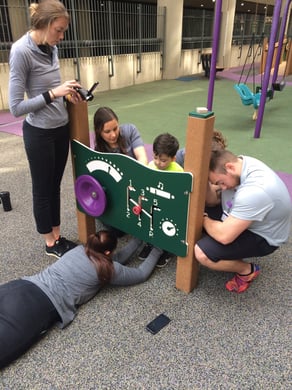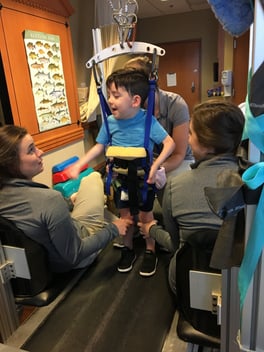NRN Spotlight: Nachreiner Family - Blog - Reeve Foundation
Nothing could prepare Jennifer and Eric Nachreiner, or any parent, for the spring morning when their lives changed forever.
“Our son Nolan was acting a little funny when we put him in the car to go to a birthday party,” said Jennifer. “By the time we arrived, he had lost all motor and sensory function below the neck. In less than an hour, he went from completely normal to paralyzed.”
Diagnosed with a severe case of transverse myelitis, the two-and-a-half-year-old spent three and a half months in the hospital and returned home one week before his brother, Henry, was born.
 “Nolan went to therapy six hours a week for eight months in Pittsburgh where we live, but we weren’t seeing much change,” said Jennifer. “All they could offer him was one month of locomotor training. Although his Pittsburgh therapists believed he could make progress, the local system was just not set up to handle the volume and level of intensity we needed.”
“Nolan went to therapy six hours a week for eight months in Pittsburgh where we live, but we weren’t seeing much change,” said Jennifer. “All they could offer him was one month of locomotor training. Although his Pittsburgh therapists believed he could make progress, the local system was just not set up to handle the volume and level of intensity we needed.”
Self-described go-getters, the Nachreiners knew they wanted to seek out more aggressive treatment. In January 2017, Nolan started therapy at the Frazier Rehab Institute, part of the Christopher & Dana Reeve Foundation’s NeuroRecovery Network (NRN) located in Louisville, KY.
“Frazier believed Nolan could get better and they could give us the time and intensity we needed,” said Jennifer who now stays in Louisville with Nolan while Eric remains in Pittsburgh with Henry. “No matter how crazy or stressful it is now, having hope is so much easier than when we were all together and couldn’t see progress.”
In the first four months at Frazier, Nolan’s trunk control improved from zero to 10 on a 20-point scale. He can now sit for several minutes with arm supports and move his arms, wrists and thumbs. They have also seen some movement in his legs. Improved sweating has also enabled him to spend more time outside this summer because he an handle the heat better.
“His progress is slow and steady. He can now play his iPad and tickle his brother,” said Jennifer. “He is more willing to try things himself. He wants to stand up and do things on his own. Before he was willing to be a passive participant in life and now he wants to be more active.”
One of the Nachreiner’s biggest fears in coming to Frazier was Nolan’s stubborn disposition which can make it difficult for him to work well with the staff.
“With Frazier’s high ratio of techs to kids, they are able to keep Nolan entertained and engaged in the therapy,” said Jennifer. “We call going to the NRN ‘going to his friend’s house’ and it really feels like that for him.”
This kind of attention to detail is one of the pediatric NRN’s many distinctions.
 “Many places have all the services these kids need; the difference is that the NRN pulls all the services together as part of a recovery-based team. A team about hope, that translates science into therapy every day,” said Andrea Behrman, director of Kosair Charities Center for Pediatric NeuroRecovery and NRN co-director. “The opportunity to be involved in research allows both their child and others to benefit.”
“Many places have all the services these kids need; the difference is that the NRN pulls all the services together as part of a recovery-based team. A team about hope, that translates science into therapy every day,” said Andrea Behrman, director of Kosair Charities Center for Pediatric NeuroRecovery and NRN co-director. “The opportunity to be involved in research allows both their child and others to benefit.”
Jennifer agrees, “We are happy to contribute to research and data to help other kids like Nolan. I know there are other kids out there with potential, they are just not being given the right tools.”
This fall, the family will work toward transitioning Nolan back home and into the newly opened second NRN pediatric site at the Children’s Hospital of Pittsburgh of the University of Pittsburgh Medical Center. They also plan to purchase an accessible house with an in-law suite to host other families who are coming to the Pittsburgh NRN.
“Frazier has been a source of hope for us. The one thing that makes this whole thing a positive experience is the possibility of helping others who find themselves in a similar situation. We want to play forward all the generosity we have received from others,” said Jennifer. “Andrea is always asking us what new things we are seeing at home. She wants to know what the improvements mean to us, how they affect our quality of life. No one has asked us that before. I now know that with the right kind of therapy, he will make progress, and it is this paradigm shift that makes living this taxing life tolerable.”
Join Our Movement
What started as an idea has become a national movement. With your support, we can influence policy and inspire lasting change.
Become an Advocate